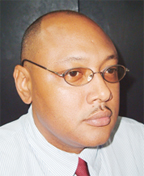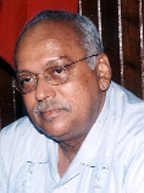The continuing spate of violent gun crimes, with sometimes deadly results, has led to renewed calls for more to be done to get illegal weapons off the streets.

Since the 2002 jailbreak, the country has grappled with rising levels of violent crime, in no small part fuelled by criminals armed with AK-47s and other high calibre weapons. Last year the police reported that robberies involving the use of firearms increased by 21% over the previous year–from 580 to 700–while there was a decrease in the number of firearms seized. In the last month, a member of the magistracy, along with his wife, was terrorised at home by a gunman armed with an assault rifle; not long after the Guyana Power and Light Company’s security boss was shot dead during a raid on illegal connections. While the police force has had some success dealing with high numbers of guns on the streets, the problem persists and both government and opposition politicians agree that urgent measures are needed. The solutions they offer range from stepping up searches, raids and monitoring of the borders to a review of the issuance of gun licences in a bid to address what has been dubbed the arming of the society.
Last week, Home Affairs Minister Clement Rohee condemned the current plague of gun crimes and developing gun culture among criminals. At the signing of a pact to grant Guyana access and use of the US’s system for tracing illegal weapons, he noted that there had been an unacceptable number of murders and robberies committed by criminals armed with all types of firearms, while a large number of firearms are recovered yearly. The minister singled out young men in particular, saying that they seem to believe that disputes must be settled by the use of a gun. “They are in many instances brutal and indiscriminate in the use of the weapons,” he said, “The state of affairs cannot be allowed to be continued.”

Only the week before, the governing PPP registered its concern about the situation, after the power company’s Chief Security Officer Clifford Peters was shot dead during an illegal connection raid in the city. Peters was shot multiple times after he intervened in an argument between a linesman and two men. The men, according to the police, escaped with Peters’ licensed revolver. One man has since been charged with Peters’ murder, although others are being sought.
“The PPP is concerned about the high level of use of firearms in crimes today,” the party said in a statement, “This suggests too many illegal weapons are around the country and in the hands of criminals.” It added that it is of the view that “measures must be taken to get the weapons off the streets as quickly as possible,” saying it is important to curbing crimes in the country.
PPP General Secretary Donald Ramotar told Stabroek News that the party has found that the amount of weapons on the road is one of the contributors to violent crime. He noted that the proliferation of illegal weapons is fuelled by other illegal activities, which bring in guns and lead to further criminal activity. “There needs to be attempts to get these things off the road,” he said, though stating, “There is no one way.”
According to Ramotar, there needs to be a combination of approaches to address the problem. Although he did not rule out amnesty as one of the solutions, he was doubtful of its effectiveness in reaching “hardened criminals” who are armed with firearms. “It won’t get us the totally desired result,” he said, adding that it might attract persons who have come by arms by various means.
‘No silver bullet’
However, Ramotar emphasised that there needs to be more raids and searches and ultimately more investigative work to find out how the guns are being smuggled into the country.
AFC leader Raphael Trotman said he was surprised that the PPP has seemingly emerged from a slumber to recognise the extent of the problem. At the same time, he said he was happy that the governing party appreciates the seriousness of the problem. He agreed that there is “no silver bullet” to deal with the situation, which demands an innovative response from the government. In addition to more concentrated efforts at the country’s borders with Brazil, Suriname and Venezuela as well as harsh penalties for those found with unlicensed weapons, he said the country needs to consider best practices in other countries, since the illegal gun problem is not unique to Guyana. Among the initiatives used in other countries have been buy-back schemes, amnesties and trades that seek to give incentives for the surrender of illegal weapons without criminal penalty. “Governments [have been] challenged to find innovative ways to confront this problem,” he said.
But according to Trotman, the PPP/C administration has to take some responsibility for the situation, given the high number of gun licences it has issued since it assumed office. Many holders of gun licences have no business with weapons, he said, noting that taxi-drivers and market vendors are among those who have been granted permits. “They are people who are connected, but did not qualify under the normal justification of life, limb and business,” he said.
He said the proliferation of guns has contributed to the cultivation of a “gun culture” which exacerbates the problem of illegal weapons. In this context, he believes that efforts to stem the flow of illegal guns need to be complemented by addressing the “arming of society” and reorienting policing away from an emphasis on “force” towards that of “service.” On the former point, he explained that many licensed persons are losing their weapons in robberies (he mentioned coming across the case of a coconut vendor who complained about losing his licensed firearm) and misusing them as well, thereby contributing to the increase in gun crimes. Additionally, he argued that the brute force approach by the police–which has been highlighted recently–has also contributed to the problem, insofar as it has resulted in an escalated response.
Force
The emphasis of the use of force in policing–an issue that was the subject of a debate at the start of a conference of Caribbean police chiefs last week–also needs to be addressed, Trotman said. Addressing the lawmen, Caricom Assistant Secretary-General Dr Edward Greene stressed the importance of policing strategies that are based on crime prevention as well as usefulness of research to guide programmes. In this regard, he supported a move away from brute force tactics towards a systematic approach that rests on the strength of intelligence. However, at the same forum President Bharrat Jagdeo said there are times when “brute force” is needed, especially given the escalation of criminal violence. “Yes Eddie, we need brute force because when you have people shooting at you with AK-47s you need to send out brute force with AK-47s to get back at them. You can’t go out there and smile and shake their hands and negotiate,” the President told Greene.
But Trotman argues that the government needs to recognise that violence begets more violence and consider the need to understand the causes of the situation. While he acknowledged that there might be need for a special police unit to respond to vicious criminals, he said as a whole the force needs to “de-emphasise” force and the use of guns. Policemen are currently driving around with M-70s and AK-47s, Trotman pointed out, saying that it gives some people the impression that they ought to be armed as well. With numerous murders and abductions in recent years, for which there has not been adequate closure, he added, there is a large pocket of people that feels like an endangered species that has to protect itself.
“The beginning [of a solution] has to be an intelligence-driven police service that sees itself as a partner of communities rather than a coercive arm of the state,” he said, while observing that “if people feel that the coercive arms of the state are responding to their concerns with force only and are not seeking to address them, they would begin to believe, in their minds, that the only way to get recognition and legitimately get anything done is by arming themselves.”
Trotman, however, made it clear that he was not trying to justify anyone’s actions, only to highlight the importance of understanding it. “We have spent too much time trying to deal with it by force,” he said, “Rather than looking and trying to understand it.” He drew attention to sociological studies in Jamaica, which have been used to inform policies and practices. Similarly, he said, authorities here need to understand what is happening in communities, especially depressed areas, and to also look at the effect of the movement of drug shipments in and out of the country.








